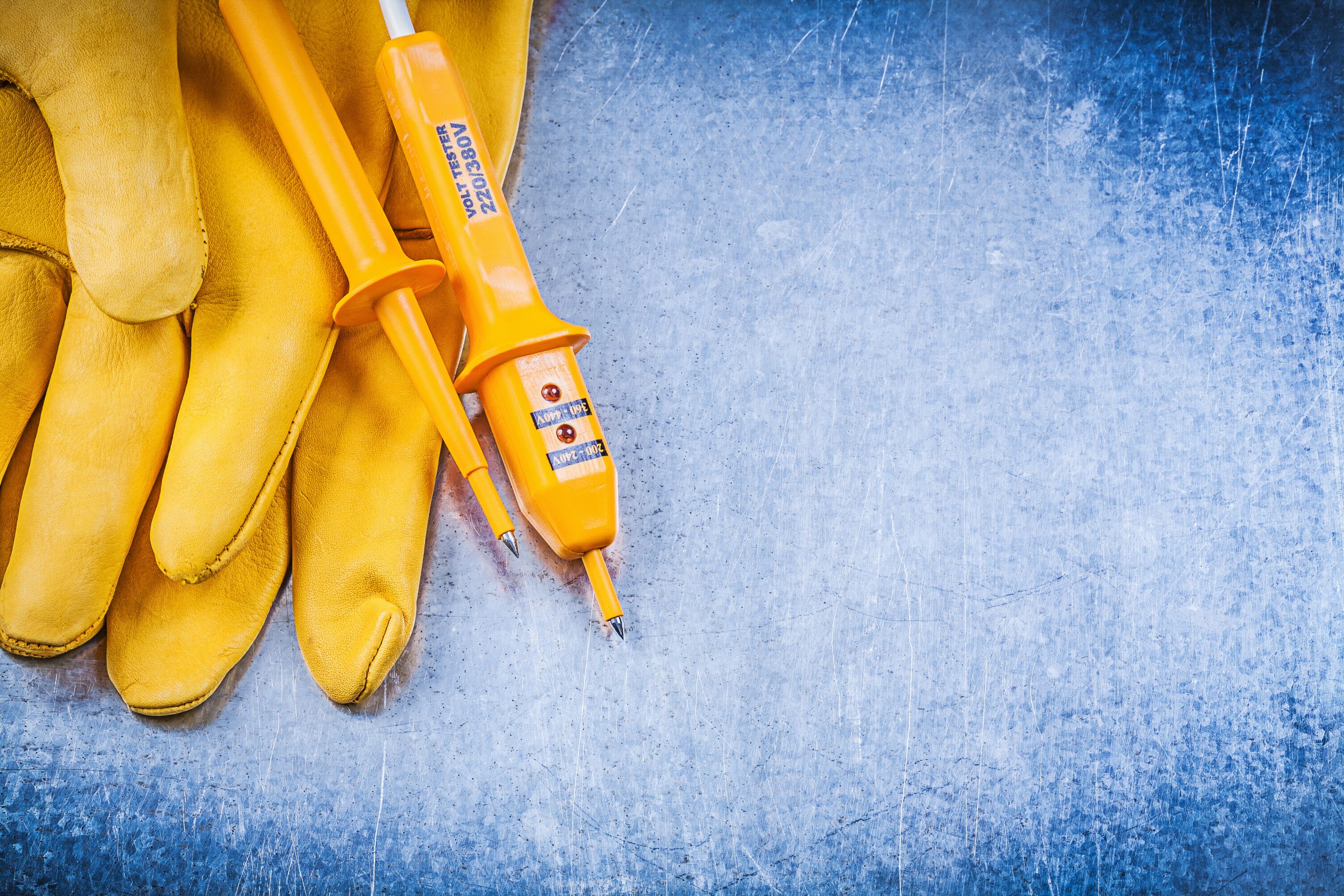Leather gloves are great thermal insulators. They allow us to feel comfortable during cold weather while being able to absorb sweat and are also suitable for warm weather. However, thermal insulation is not the same as electrical insulation. In this article, we will discuss the science of leather’s conductivity and what gloves we would recommend for electrical work.
Does leather conduct electricity?
It can, at high enough voltages or if it gets wet. Conductivity is a spectrum, and nothing is truly an insulator. While it is safe to wear regular leather gloves for electrical work that doesn’t involve very high voltages, it is not enough for serious electrical work. High-voltage-rated electrical gloves usually come with a powerful insulator made of rubber and the leather protects the rubber insulator.
Leather’s electrical resistance
Leather is quite electrically resistant. In this paper, ironically about improving leather’s electrical conductivity, it is stated that leather has a resistance of 109 – 1010 Ω. That resistance is actually quite high and it would take a high voltage for you to experience electric shocks.

However, you should take note that there are other factors that can lower that resistance like getting it wet or if the leather is damp.
Either way, we should warn you against using any type of leather gloves on their own without rated rubber gloves. Please use electrical work gloves that have passed insulating standards.
Leather as electrical protective equipment
Leather gloves have been used by welders for a really long time, and it’s hard to replace leather when it comes to welding gloves. However, welding gloves are not serious electrical work gloves. Welding gloves usually only serve to protect you from the heat and not from the electricity.
If you do serious electrical work and you need gloves, DO NOT buy welding gloves. Leather gloves only protect the insulator gloves underneath.
How many volts can leather gloves handle?
Leather gloves usually are not able to meet the standards for high-voltage electrical work. Which is why they usually have a separate rubber inner sleeve. This doesn’t mean that the leather protectors are not important, however. The leather protectors keep the insulator rubber gloves safe from scratches and punctures from sharp tools that the electricity might find its way into.
The Occupational Safety and Health Standards (OSHA) have put out their standards for electrical protective equipment. This includes maximum AC and DC voltages so that you are able to use the gloves safely.
Here are the classes of rubber-insulating gloves that you should match or surpass the voltages you’re working with.
Class 00 (Beige Label): 500V AC or 750V DC
Class 0 (Red Label): 1,000V AC or 1,500V DC
Class 1 (White Label): 7,500V AC or 11,250V DC
Class 2 (Yellow Label): 17,500V AC or 25,500V DC
Class 3 (Green Label): 26,500V AC or 39,750V DC
Class 4 (Orange Label): 36,000V AC or 54,000V DC
Recommended leather protectors for electrical work
If you’re planning to do some electrical work, here are some leather gloves with good voltage and insulation ratings that you can choose from:
National Safety Apparel Class 00 Rubber Voltage Insulating Glove Kit
- KIT INCLUDES: Pair of 11" Class 00 Rubber Voltage Insulating Gloves, 1 pair of 10" Leather...
- TESTED: Each pair of rubber voltage insulating gloves has a maximum use voltage of 500V AC/ 750V DC...
- COMPLIANT: Rubber Voltage Gloves are NFPA 70E-2015 compliant for arc flash; CSA Z462-15 compliant...
These gloves are great for low-voltage work ranging from 500V AC to 750V DC only. This electric glove kit includes leather protectors for the rubber gloves as the insulated rubber gloves provide electrical protection with a Class 00 ASTM rating. If you’re planning to do some electrical work at home, these gloves should be enough. However, if you’re dealing with high voltages, we highly recommend you go for gloves with a higher voltage insulation rating.
MAGID Leather Lineman Electrical Protector Work Gloves
The MAGID Leather Protectors are only protectors for your ASTM-rated rubber gloves. These have great reviews and are able to make your rubber gloves last longer. Using the rubber gloves on their own can be difficult and may damage them when they are abraded and scratched which will lead to a shortened lifespan.
MAGID PowerMaster 12501PS Leather Protector
These leather protectors come in various sizes, allowing you to place it over your ASTM-rated rubber gloves even if you have big hands. If you have smaller hands, they also have smaller sizes as smaller leather protectors are quite rare.
These also come with a pull-tightening system so they don’t come off easily and expose your rubber gloves or your hands.
Pros and cons of using leather gloves for electrical work
If you want to use leather gloves on their own, you should avoid doing anything that involves voltages that exceed 400 volts. If you’re planning to buy expensive rubber gloves with leather protectors, here are some reasons why it may or may not be worth it depending on your work.
Advantages:
- Taxing labor like electrical work involves a lot of hazards including cuts, punctures, and abrasions. Real leather gloves are great at protecting you from puncture hazards since they are very durable and are designed to withstand heavy-duty work.
- Electrical work will also expose you to deal with heat thus, making leather gloves a great insulator to protect you from burns.
- Holding objects with bare rubber gloves can be difficult. The leather outer layer can help with gripping objects easier.
- If your work does not exceed 400 volts, the comfort of leather gloves cannot be surpassed by rubber gloves.
- Rubber gloves need to be replaced every few months, but leather gloves can last a long time as long as you’re not using them for anything too extreme.
Disadvantages:
- Leather gloves are only ever suitable for hobby or indoor electrical work. They cannot handle extreme voltages that exceed 400 volts.
- Leather can become conductive and can even conduct electricity less than 400 volts if it gets wet.
- You may not be able to use your leather gloves with your rubber gloves since you will most likely need to buy a bigger size to fit over them.
Conclusion
Whether you are an on-the-job professional electrician or you just simply want to fix a few electrical works at home, knowing the right equipment to use could be a life-or-death decision. When dealing with electricity, whether it’s a low or high voltage, you can never be too safe. That’s why it’s important that you read through this guide carefully and know which leather gloves are voltage-rated.
FAQ
Do leather gloves prevent electric shock?
No, you can get electrical shock even if you’re wearing leather gloves. Not all leather gloves are rated under an insulator class as we mentioned above. It’s reckless if you use regular leather gloves and assume that you’re protected from high-voltage shocks. If you’re unsure if your leather gloves are properly insulated, it’s still best to wear rubber gloves underneath for safety measures, or better yet, go for gloves that are specifically made for electrical work.
Does leather cause static electricity?
Regular leather used for most gloves, shoes, pants, or jackets normally does not cause static electricity. The only reason it might generate static electricity is if it collects dust over time causing electrostatic charging. Static energy can sometimes cause sparks which can cause fire around highly-flammable materials, but this is a very rare phenomenon involving leather. In most cases, it will just cause the leather to have a darker and heavier pigment.






